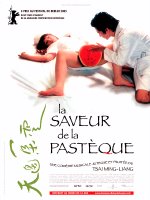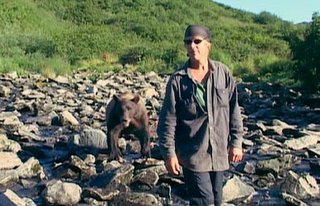OPENING SEQUENCE
High angle stationary camera (wide angle lens) at the crossing of perpendicular underground tunnels. Dirty cement, artificial neon lights. Distant sound of heels resonates. Real-time crossing (90") of 2 women from opposite sides of the screen to the other. A long plan-sequence shot like a closed-circuit surveillance camera (repeated motif in the rest of the film). Faces are too small to be identified, although one wears a nurse uniform and carry a watermelon: the porn actress (Sumomo Yozakura) of the following sequence.

Almost a satire of the classic vaudeville tragedy opposing "wife" and "mistress" rivals, legal love and physical satisfaction. In fact they represent the existential dilemma of the central character [HE] (Lee Kang-Sheng) between faltering platonic romance and oblivious hardcore activity, two ways out of an overbearing aloof routine. The sexual triangle at the heart of the story : the innocent love interest, museum guide [SHE] (Chen Shiang-Chyi), and the pornstar live nextdoor, unaware of eachother.
Although unmarried in this fable, the protagonists engage in a very tender but passionless, attentionate and indifferent, hide-and-seek juvenile flirtatious game, unable or unwilling to attach one-another. Surreal/discontinuous atmospherical romance like in 2046 (2004/Wong).
note: the 2 lead protagonists will be refered in my text as "HE" and "SHE" for clarity.
FORM
 Repeating a gimmick used in The Hole (1998) both a tender homage and burelesque mockery of cheesy Hollywood/Asian musicals, Tsai collides his "boring contemplative style" with its total opposite, a deviant entertainment. Sentimental cover songs of the 50ies moraly-correct era are lip-synched by his actors disguised with ridiculous home-made costumes, no choreography, kitsch design and sexualized imagery to pervert their original meaning.
Repeating a gimmick used in The Hole (1998) both a tender homage and burelesque mockery of cheesy Hollywood/Asian musicals, Tsai collides his "boring contemplative style" with its total opposite, a deviant entertainment. Sentimental cover songs of the 50ies moraly-correct era are lip-synched by his actors disguised with ridiculous home-made costumes, no choreography, kitsch design and sexualized imagery to pervert their original meaning.Five musical numbers, clash of cultures and times, substitute to the words unspoken in the film with dream sequences revealing a little more about their emotional load. They are more populated than the city, maybe to emphasize the sensation of isolation of these characters.
"There’s still some incredible imagery on display here from time to time, such as when shampoo seems to enclose Lee’s head in the titular cloud or when we see him sleeping suspended over a vertiginous stairwell, but these moments are just isolated moments. Throughout, the imposing landscape of the city makes the few people that move throughout it almost feel like afterthoughts, and Tsai’s decision to frame his leads so that even when they share a frame one’s usually leaving or sleeping pays off thematically, but not really emotionally."
Jeremy Heilman
They live in the same housing project (uniformized/anti-socialization) without ever crossing path. Only outdoor could they see eachother. The clever mise-en-scene of their meeting allows to observe each of them before the other has aknowledged their presence :
She recognizes HE sleeping on the swing. SHE falls asleep waiting for him to wake up. HE wakes up and doesn't recognize her. Then SHE wakes up : uncomfortable silence. Bad timing, their disposition to open up are not coordinated and makes the relationship impossible (just like the distance between Taipei and Paris materialized this ambiguous incompatible attraction). SHE asks if he still sells watches, refering in a one-liner to the two precedent episodes of the trilogy featuring these characters (What Time is it There? 2001/The Skywalk is Gone, 2002)
CONTEXT
The project was originally meant to study the double-life of South Asian foreign labor, abused and exploited like under-citizens without visa, lost in a stateless limbo, confined to a marginal existence, selling soul and body for survival. They belong nowhere, incapable to return home, unwelcomed to fit in. If later extrapolated to the milieu of pornography, deviant love and perversity, which suggests a caricature of society, Tsai's latest provocation immerses a seemingly superficial romance in a social environment with comparable issues. In the first script, an aunt uncovered her nephew was a porno actor. Changed to a girlfriend due to casting problems, the role commits to a more intimate humiliation, adding jealousy to shame. She must swallow her pride to forgive if she wants to save their relationship, but is it that simple?
PREMISE / DROUGHT
In the near-abstracted social anticipation, an exceptionally dry season in Taiwan drained rivers and water supplies, the price of bottled water skyrocketed, and the population fell in an arrested languor. An idealized hot dry summer. Deserted streets instill a sense of suspended apocalypse. This sunshinier weather shows the wealthy areas of an idyllic Taipei in contrast with the usual trademarks of Tsai Ming-Liang's previous films: poor, overcrowded, dirty, polluted, and derelict city with non-stop pouring rain, water leaks or overflows.
SYMBOLISM OF WATER
The theme of essential substitution proves particularly metaphoric (and revelatory) in light of Tsai Ming Liang's own comments on the symbolism of water in his films (as transcribed in the Editions Dis Voir publication, Tsai Ming Liang): "...I always regard the characters in my films as plants which are short of water, which are almost on the point of dying from lack of water. Actually, water for me is love, that's what they lack. What I'm trying to show is very symbolic, it's their need for love." acquarello
- Thirst = desir: incarnation of an immaterial feeling into a vital physical need.
- Water bottle = human body either filled with love or emptied, either topped with a cap or parted from a soul-mate.
- Watermelon juice = romantism, love stream, fun, bodily fluids.
- Full Watermelon (green, dry) = emotion, feeling, baby.
- Cut open watermelon (red, wet) = vagina, sex.
- Food = sex, sensuous appetite, sexual fantasy.
 SHE picks up empty bottles in trash cans and steals water from the public toilet flush! She also finds a watermelon in a dirty canal. It tells about her desperate craving for love... She capitalizes/stockpiles water bottles in her fridge like in a safe/incubator.
SHE picks up empty bottles in trash cans and steals water from the public toilet flush! She also finds a watermelon in a dirty canal. It tells about her desperate craving for love... She capitalizes/stockpiles water bottles in her fridge like in a safe/incubator.Unlike HE who doesn't seem to worry about water conservation (love is not a concern to him).
"she forces glasses of watermelon juice on him, despite her overstock of bottled
water. " Adam Balz
 In opposition to the wet orgasm of Warm Water Under a Red Bridge (2001/Imamura), illustrated by an hyperbolic water leak from the woman's body, the porn actress from the same country plays here with an empty bottle striving to simulate a mechanical excitation. In this scene, the mislaid cap is separated from the bottle.
In opposition to the wet orgasm of Warm Water Under a Red Bridge (2001/Imamura), illustrated by an hyperbolic water leak from the woman's body, the porn actress from the same country plays here with an empty bottle striving to simulate a mechanical excitation. In this scene, the mislaid cap is separated from the bottle. The first porn scene overtly identifies the watermelon half with sexual symbolism. The foreplay in the flesh of the fruit triggers pleasure to the nurse. Directly paralleled by SHE watching TV in a lascivious position with an opened watermelon squeezed between her thighs too, scooping it up with a spoon. Thus before they even met, both on their own. The parallel montage suggests the two actions are simulatenous as if the fantasy of SHE was enacted by HE. They are in the mood for sex, each on their own way.
In a memorable scene, HE and SHE eat crabs they cooked together, we do not see them but their shadows on the wall (like the ghost dance in Dreyer's Vampyr, 1932), illustrated by loud suction noises and laughters (echoes of the squishy noises of the first porn scene). Visually self-censored like in erotic scenes from the Hays code era. A strong symbol of sexual intercourse through voluptuous appetite, followed by the scene underneath the table, both lying sleepy smoking a cigarette (like after making love).
(s) ++ (w) +++ (m) ++++ (i) +++ (c) +++
Berlin 2005:
Silver Bear (Outstanding Artistic Achievement) + FIPRESCI Prize
Alfred Bauer Prize for Cinematographic inovation
Official Website (french, 2 musical clips, trailer, 3 scene clips)
Coming up next :

